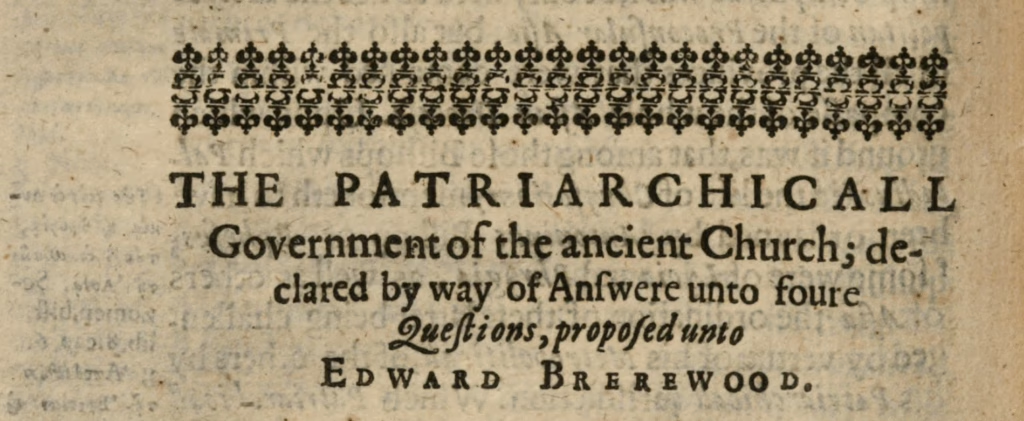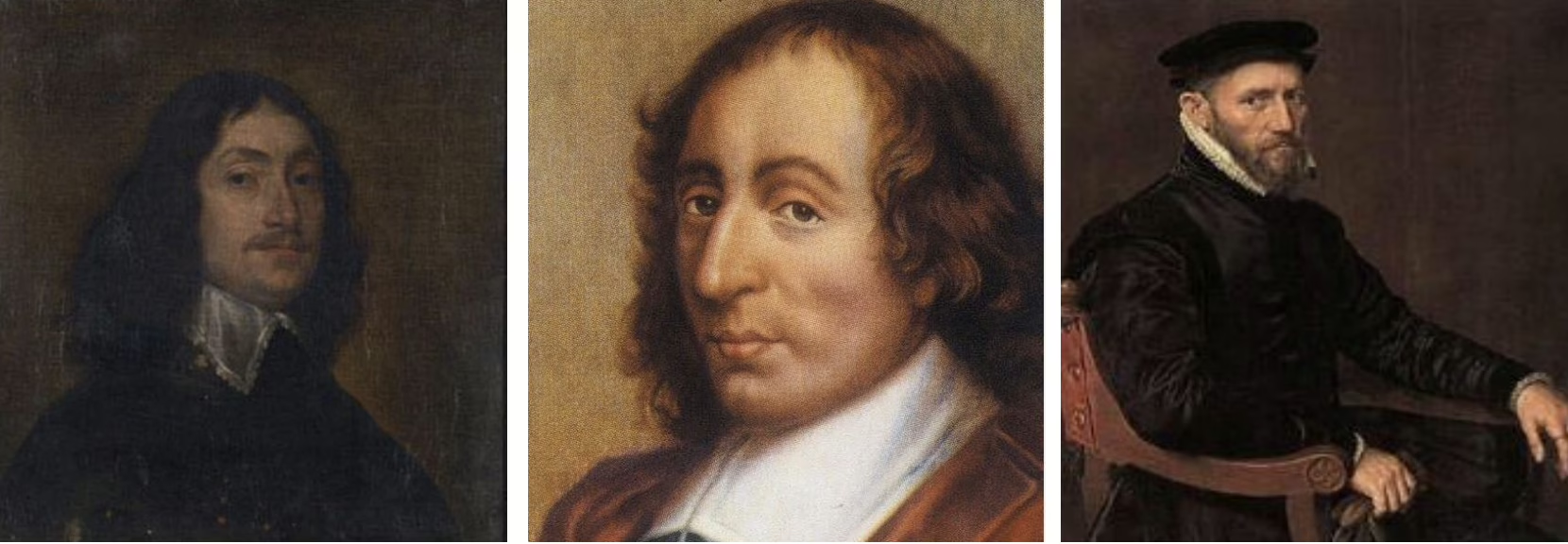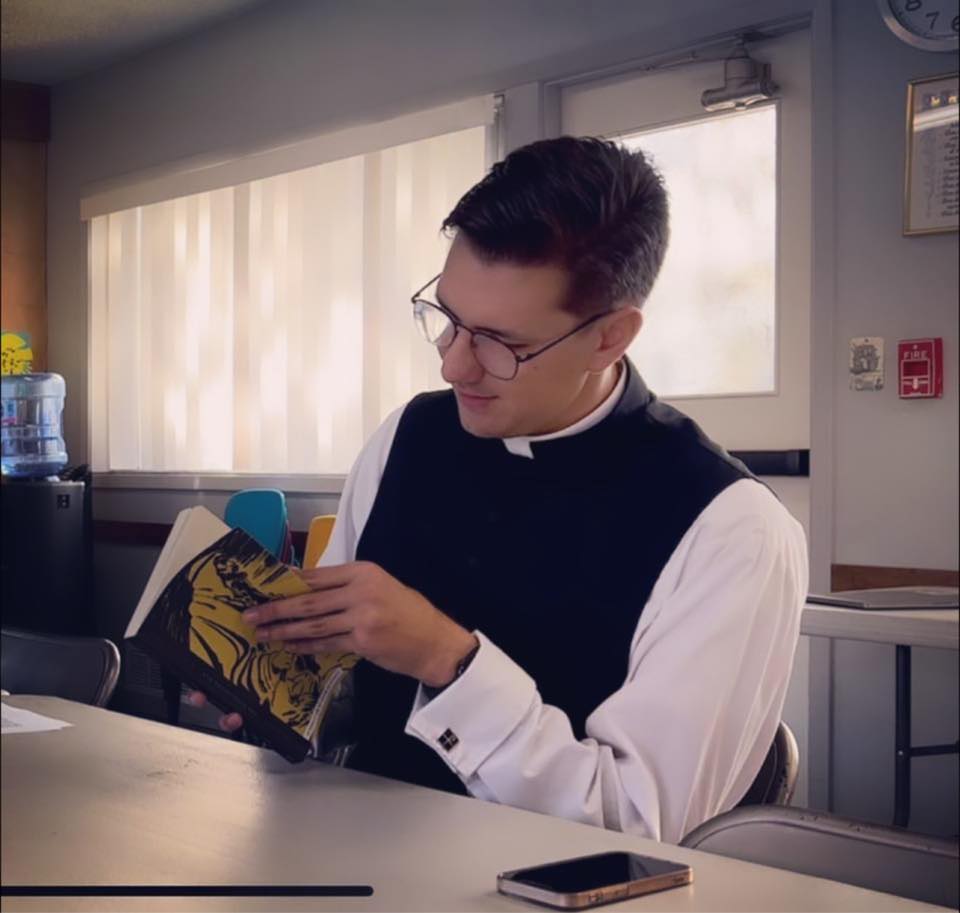Edward Brerewood (c.1565–1613) was an antiquary, mathematician, and professor of astronomy, remembered also as a member of the Elizabethan Society of Antiquaries. A native of Chester—where he served three times as mayor—Brerewood combined his academic study with a fascination for the history of the Church. He is likely best remembered for his work on the origin of languages.
Among his wide-ranging interests, Brerewood examined questions of church polity and the early jurisdiction of the British church. The following selections are drawn from his discussions of the patriarchates and the independence of the ancient British church before its later subjection to Rome.
I’ve updated the spelling (and lightly edited some of the sentences to be more readable) and I have transcribed it from about page 110 of a 17th century Oxford University collection “Certain briefe treatises, written by diverse learned men, concerning the ancient and moderne government of the Church.”

To what Patriarch did Britain belong? To Rome, or another?
Answer.
Britain was subject neither to the Patriarch of Rome (which your reasons touching the observing of Easter and the rejecting of Augustine, sent by Gregory, might well prove) nor to any other foreign jurisdiction of the Church. Being of itself (as it was) one of the six dioceses of the Western Empire, it had a Primate of its own, which (as I take it) was the Archbishop of York.
For three Metropolitans there were in Britain (as there were then but three Provinces) in the time of Constantine the Great and of the Nicene Council.
One of Maxima Caesariensis, the Bishop of York; another of Britannia Prima, the Bishop of London; the third of Britannia Secunda, the Bishop of (Isca) Caerleon in Monmouthshire. This continued until King Arthur’s time, and was then translated to St. David’s, where it remained in the form of an Archbishopric (having the Bishops of Wales for suffragans) until the time of King Henry the First, by whom it was brought under the obedience of Canterbury.
And although Britain was afterwards divided into five Provinces, Valentia and Flavia Caesariensis being added to the former, yet these being erected and taken out of the others after the time of the Nicene Council, the ancient Metropolitan Churches by decree of that Council retained their ancient prerogatives.
The Archbishop of York as Primate of Britain
The Archbishop of York, I say, was Primate of Britain, while the Romans held the government, and afterwards while the Britons held possession of England.
For although London was anciently a city of great trade (as Tacitus records of it), it lacked the prerogatives that York then had. For, first, York was the principal colony of the Romans in Britain. Secondly, the Emperor’s palace was there. Septimius Severus died there, and from thence his sons Bassianus and Geta departed as Emperors. Constantius Chlorus the Emperor died there also, and there his son Constantine the Great was first proclaimed Emperor.
There was also the Praetorium of the Diocese of Britain, and the Lieutenant there kept residence; therefore it was the Metropolis of the whole Diocese of Britain (and not only of one Province, as London was), and consequently it was the Primate’s seat. For so it was usual in all other Dioceses of the Empire: namely, that where the Praetorium was, and the Lieutenant (Vicarius) held his residence for administration of justice to the Provinces, there the Primate of the Diocese was seated also.
And therefore Spartianus, in the life of Severus, calls it the city “excelling.” Veniens in civitatem (Yorke) primum ad Bellonae templum ductus est — “Coming into the city of York, he was first led to the Temple of Bellona” (that temple stood where St Peter’s Church now stands).
And therefore it was not without cause, that Gregory, at the first conversion of the English, was so careful to erect an Archbishopric as well at York as at London (although it never came to London, but was established at Canterbury) and that with such equal terms of honour, that the Archbishops should have precedence each before the other, according to the antiquity of their ordination.



Leave a Reply